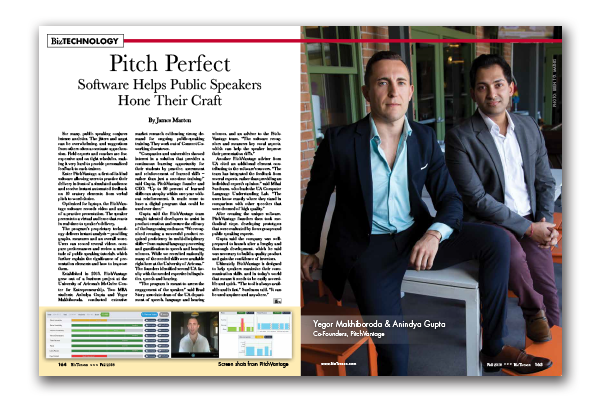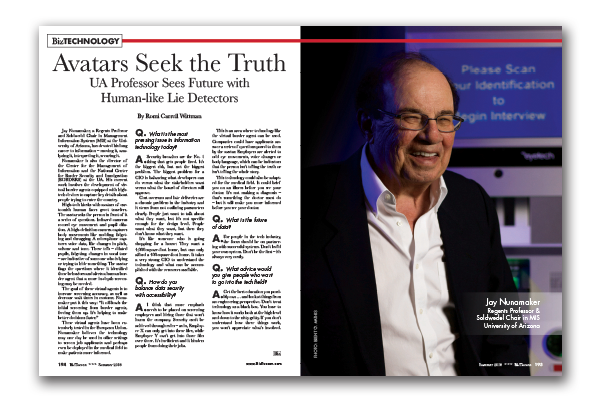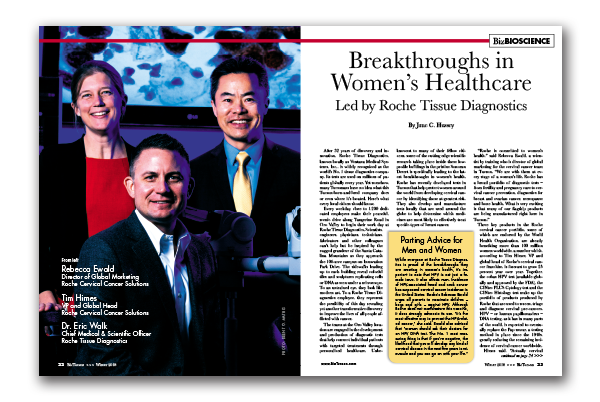
Creating Next-Generation Diagnostics at Ventana Medical Systems
By Romi Carrell Wittman –
Real-life medicine thankfully lacks the theatrical drama of a television show like House – but it’s no less of an art form. Diagnostics, the specialty of Ventana Medical Systems, especially embodies this concept.
Mara Aspinall, who took over as CEO and president of Oro Valley-based Ventana Medical Systems last September from Hany Massarany, says medicine is a marriage of science and art. She has devoted her career to improving diagnostics and, thus, treatments and patient outcomes.
“Diagnostics is the critical element of health care today,’’ Aspinall says. “Each and every patient needs to get the right diagnosis in order to get the right treatment. One thing a cancer patient doesn’t have is time. You can’t waste time on a treatment that won’t work.”
Fast, accurate diagnostics are critical to determining rapid, effective treatment options, and Ventana, a worldwide leader in diagnostics technology, is revolutionizing the field. “The question won’t be ‘Can I be treated?’” Aspinall said. “It’ll be ‘How can I be treated?’ ”
Aspinall comes to Ventana at a time of explosive growth for the company. Founded in 1985 by University of Arizona pathologist Dr. Thomas Grogan, the company holds a 60 percent market share for automated cancer diagnostic systems in North America.
Swiss-based pharmaceutical giant Roche acquired Ventana in 2008, giving the company a global footprint and virtually limitless growth potential. In 2009, the company boasted revenues of nearly $500 million.
Grogan was involved in the CEO selection process. “Mara was selected from among 15 candidates in a global search because of her sterling experience and reputation in running medical diagnostics companies,” he said. “She also stood out for her high intelligence and values.’’
Aspinall brings with her some pretty impressive bona fides. She graduated magna cum laude from Tufts University and earned an MBA from Harvard University. She is the founder and former CEO of On-Q-ity, a leading-edge diagnostic company focused on providing doctors with the tools needed to make the best treatment decisions for cancer patients. She was also the president of the genetic and pharmaceutical units of Genzyme Genetics, one of the world’s largest biotechnology firms.
Personalized health care, especially in the fight against cancer, is a passion of Aspinall’s. Cancer is the “number one fear’’ and a top killer in the United States, she said. “We’ve made a lot of progress, but it’s not good enough. Cancer affects all of us. I’ve never been in a room where someone has not been impacted in some way by cancer.”
She says the future of cancer treatment lies in more sophisticated and accurate diagnosis. “Tissue diagnostics used to be, ‘is it cancer or not?’ The diagnosis of cancer starts with the analysis of the tumor tissue from the biopsy. Today we can look at the tissue on a molecular level.”
At the turn of the century, if someone said they were tired all the time and bruised easily, the best the doctor could tell them was they had a disease of the blood. “Sixty years later we could tell them they had leukemia,” she said. “Today we can pinpoint exactly which type of leukemia they have and treat them accordingly.”
To speed up diagnosis, Aspinall is focused on automation. “We must acknowledge that medicine is still an art, but we can bring more predictability, reliability and regularity to those diagnoses,” she added.
While automating diagnostics may sound like an easy sell, Aspinall says there are some challenges in getting the industry to embrace it. The current system incentivizes action, which means proper diagnostics gets short shrift in the race to treatment.
Unfortunately, this approach is taught to medical students from the very beginning, with medical schools devoting precious time to biology and chemistry and little time left over for diagnostic technologies, she said.
“The health care industry doesn’t understand, or perhaps appreciate, the value of diagnostics. We need to change this way of thinking.”
Changing the status quo is always a challenge – but not impossible. Aspinall says it will happen when medical professionals look at the individual patient first, their disease second.
“We have to shift our thinking so that we’re making sure we have the right diagnosis for the individual patient, not the average patient,” she added.
Aspinall is excited about Ventana’s future and the top scientific, medical and business team that has been assembled. “I’ve run large companies and small ones. Here, I see a unique passion and entrepreneurial spirit: See it. Own it. Solve it. That spirit is essential to creating products that help cancer patients get the most accurate diagnosis.”
Aspinall said employees of Ventana have a special motivation. “We have an important responsibility in health care. We are with people at the toughest times of their lives – when they are diagnosed with cancer. They are depending on us, and that drives us forward.”





